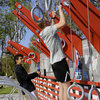Michaela Kehrer teaches about farming across grades and disciplines
BERNE — “The cool thing is agriculture is everywhere,” says Michaela Kehrer.
She has been teaching about agriculture and its many related subjects at Berne-Knox-Westerlo’s secondary school since 2017. That year, she also founded a chapter of Future Farmers of America in the rural community.
Now, Kehrer has been named Outstanding Agriculture Educator for the FFA Region VI National Association of Agricultural Educators. She is one of just six finalists across the United States; the winner will be named in December.
Kehrer started her journey as an ag teacher when, growing up in Rhode Island, her father’s best friend urged her to attend an FFA meeting — she had been more interested in marine biology or history at that point — telling her he wouldn’t mention it again if she didn’t like it.
She loved it, especially the camaraderie.
A vibrant woman, Kehrer has always been drawn to male-dominated fields, she says in this week’s podcast at altamontenterprise.com/podcasts.
She studied landscape design — like farming, another male-dominated field — for a degree at Cobleskill before earning a master’s degree in ag education at Cornell University.
Kehrer serves as a role model at BKW where a lot of girls were initially attracted to her classes; she is also enthused about teaching boys.
Her students aren’t “cookie-cutter,” she says. Although many say they’d like to be veterinarians, Kehrer noted, she exposes them to a wide range of careers that can come from agricultural training.
Many of her students like to hunt and fish and, using that interest, she teaches them about the importance of ecosystems and natural habitat.
“I try to teach them how it applies to their lives,” she said.
Kehrer reels off a long list of rotating classes that she teaches, ranging from wildlife and animal-science courses to floral and landscape courses.
The science chairman at BKW, Neil McConnelee — a physics teacher and cattle farmer — also teaches introduction to agriculture courses.
Kehrer uses her older students as mentors for kids in younger grades. Every June, her students hold Agriculture Day for pre-kindergarteners through sixth graders to learn about farming and farm animals.
This year, Kehrer has started an “ag buddies” program where older students will teach younger ones. In the past, learning about dairies, elementary students made their own ice cream or, learning about maple sugaring, they had a pancake breakfast with real maple syrup.
Agricultural curricula has infused the school, crossing disciplines as well as grades.
Giving an example of cross-discipline projects, Kehrer worked with tech teacher Joshua Baker to build a bridge that makes the on-campus Uhai trail, once cut off by water, accessible again. Kehrer uses the trail to teach about wildlife.
Her students made signs to identify wildlife along the trail and also to point out invasive species.
Another project involved building a shed, half of which is used as a chicken coop. The chickens being raised there have just started laying eggs.
Another project is a grant-funded hoop greenhouse in which classes of varying ages have taken on the task of growing peppers, carrots, squash, dill, mint, radishes, tomatoes, and sunflowers. “Each class adopts a bed or two,” said Kehrer.
Among the many grants Kehrer has helped secure is the most recent one, for $5,000, that the FFA chapter is using to buy life-size fiberglass models of a cow, horse, and pig. Students will research, design, and paint the internal organs of each species on one half of the models; on the other half, they will paint the markings for a given breed standard.
The BKW chapter of Future Farmers of America is active on many fronts. Next month, 30 students will go to Oswegatchi, a camp in the Adirondacks, Kehrer said, noting the trip is booked to capacity.
Members compete in contests and career development events; they also do public speaking and learn about leadership. Until COVID-19 intervened, the group made an annual trip to Indianapolis for the national FFA convention; BKW’s participation will be virtual this year.
Kehrer repeatedly credits her BKW colleagues and other FFA chapters for her many initiatives.
“I’m a constant learner. I’m always watching what others are doing,” she says.
She also urges everyone: “Support your local farmers.”


